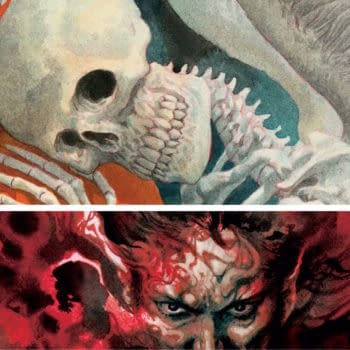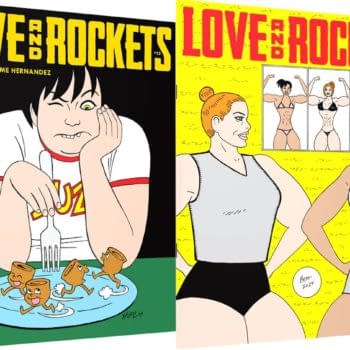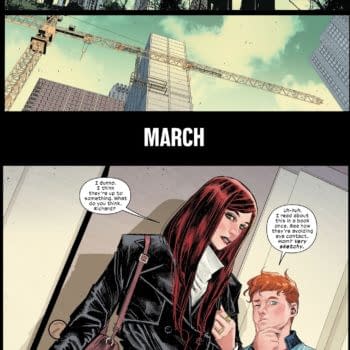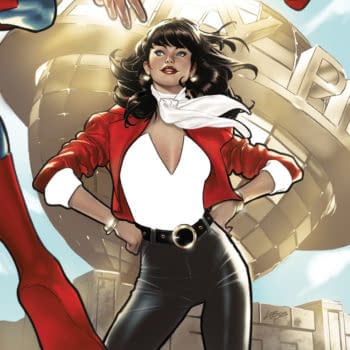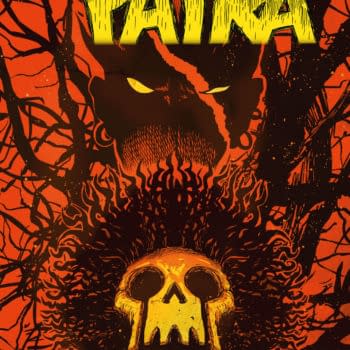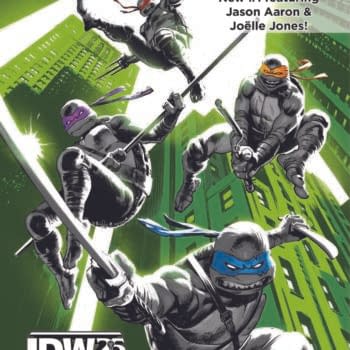Posted in: Comics | Tagged: Ande Parks, Comics, commentary, dynamite, lone ranger
Ande Parks Commentary On Lone Ranger #6
Ande Parks, writer of Lone Ranger #6 writes for Bleeding Cool;
Page One
This issue deals with the aftermath of defeating Marshal Dorsey. It also hits the final notes on the themes of our Hard Country arc: that the Old West was a harsh environment in which to try to help people, and that the moral choices confronting the Lone Ranger there are complex, even for a man with very clearly-defined values.
Thus far, we have dealt only with Dorsey and his cronies. We have not met any average citizens of Utopia. Our stories are generally about big men and big actions. Our first issue focused on an average family, but it was the actions of our bigger-than-life heroes that changed everything. I like this hero genre. I want to tell big stories, but I don't want to lose sight of the normal folks who move around in the same world as our big heroes and villains.
So, here are a couple of the "normal" people who have been living in Utopia. They have been there since before Dorsey came along. They have been complicit in Dorsey's actions… maybe.
Of course, the not-so-subtle idea that Tonto is something less than a white man continues to show itself.
Finally, lovely staging here by Esteve, particularly in the first panel. This stuff is very difficult, despite how easy he makes it look.
Page Two
The town doctor refers to Claudia Dorsey's treatment of Tonto's wound, without knowing who did the treating.
Lone Ranger's final line here is one of my favorite moments of the arc. Note the fresh rope burns on the Lone Ranger's neck. Great coloring by Marcelo.
Page Three
The Lone Ranger's question in panel three is as close as he will get to directly calling out the people of Utopia… the people who were willing to stand around and watch the hanging of a good man. It's enough. The doctor knows what he's done.
I've examined this theme before, particularly in my Union Station graphic novel: What does a common man do when faced with the greater good vs. the well-being of him and his family? The residents of Utopia caved to Dorsey's evil because they were hungry. Because standing up might have gotten them killed. They did it for selfish reasons. They weren't willing to put everything on the line for what they likely knew in their hearts was right. It's an issue we'll get back to soon.
Page Four
A little more background on how Dorsey took control of this town, and a path for the Ranger to visit Dorsey's widow. The final panels shows the Lone Ranger personalizing Tonto for the doctor. He's not just a "savage" or even an "Indian". He's a man called Tonto.
Page Five
I'm really thrilled with how this silent page plays. Esteve drew it so well. The Lone Ranger's awkward walk through a crowd of people who were willing to watch him die, and then the angry taking back of the hat, gun and badge… I think it really works thanks to Esteve's wonderful storytelling.
Pages Six to Nine
I could have gone two ways with Dorsey's gang: they could have been faithful followers who believed in Dorsey's biblical schemes as much as their boss did, or they could have been guys who were just along for the money. I chose the latter. Some of Dorsey's most loyal men are completely on board with his plans. The rest are hired and/or bullied muscle. Guns for hire who just got pulled into Dorsey's web. As mentioned by the doctor in town, Dorsey doesn't allow these men to live in the tow. Having single men among the decent women of the town wouldn't be proper. So, the henchmen camp outside of town. Some are completely loyal to Dorsey. Some not so much. Some, as we see in this scene, have grown quite bitter about the arrangement.
More fantastic work by Esteve here. All these men are drawn as unique individuals. Each fits the part written for them perfectly, with his own character. The clothing is unique, as are the hats (a special interest of mine).
As soon as Karl hears Dorsey is dead, he's ready to make his move. He's as cold-blooded as his former boss, and as calculating. Karl instantly eliminates the men he knows will be loyal to Dorsey, and makes his argument to the rest. It's pretty damn convincing.
I love page nine, with the guy dying at Karl's feet, even as Karl continues to make his point. At least Karl does finally put him out of his misery. Now, we've got these guys headed to town, with the Ranger as their only apparent opposition.
Pages Ten to Fourteen
I have to be honest here, and risk seeming arrogant. Believe me, I'm not over-confident about my writing. I am brutally honest with myself about it. I am so hard on my own work that I often have to force myself to turn it in. It almost never meets my expectations. That is, overall, a good thing. It keeps me trying… hard.
That said, I am really proud of this scene. As I've said before, the character of Claudia came to me on the fly as I wrote these issues. I discovered her story as I worked. I did know early on that she could provide a very complex moral issue with which I could confront the Lone Ranger. This scene forces a man with clear values into a situation where those values are very difficult to apply fairly. Could the Ranger ever prove what Claudia did? Is it worth proving, knowing what she's been through? Even as I wrote this scene, I wasn't entirely sure how it would play out. I did not come into this part of the story with a tight outline. I had to place myself in the Lone Ranger's position and evaluate his options. I think I know this man, and I think he makes the right call here.
By the way, I usually find it helpful to use people I have known personally as a loose template for the fictional characters I'm writing. I don't always do it. In the end, you have to make things up in this job. For the Ranger, though, I do keep someone in mind: my grandfather. He was, frankly, not as wise as the Ranger is. He did, though, share John Reid's values. Grandpa saw the world in simple terms of black and white. He knew there was most often a right option and a wrong one. It made his life pretty simple. It made him a good man.
Claudia is just a bit of a smartass with the first answer she gives the Lone Ranger: "BURNED". She's playing up her difficulty communicating just a bit, to her own benefit.
I love how Esteve has drawn the top of page twelve. The Ranger's sympathy is palpable, and it makes what comes next even more poignant.
At the end of the scene, the Lone Ranger is confronted with the theme of this entire arc, and it frustrates the hell out of him. Life out here is hard and unfair. Good people are victimized. They need someone to stand up for them from time to time. The Ranger wants to be that man, but it's proving to be a complex mission.
Page Fifteen
If Tonto is going to die, he wants to be with "his people", and he doesn't just mean his tribe. For reasons we'll look at in our next arc, Tonto is far removed from his own heritage, but he's not completely divorced from it. He certainly doesn't belong to the white man's world.
I made a mistake here, and didn't catch it until it was too late. Tonto should not use the word "Shaman". That term comes from the white culture. It is not a word used by Native Americans, as far as I can tell. Alas, I didn't catch this until I was working on the next arc. Frustrating. I like to get this stuff right.
Page Sixteen
The last line of this page isn't very clever. It's simple and direct, like the Ranger himself. I think it works.
Pages Seventeen to Twenty
The Ranger walks out to face men who greatly outnumber him. The good people of Utopia are, again, content to simply watch it happen.
I'm gotten a little heat about the language in this book. It's true that we have used a few choice words from time to time. I think it's been limited to "sonofabitch" and "damn" for the most part. It's true that the Ranger has traditionally been used in stories that appealed to young readers, viewers and listeners. I want our book to be accessible to younger readers, but we are not catering to them alone. I do not think using an occasional word that could be heard any night on prime time network TV means our book is not okay for kids. I want to write realistic stories that feature bigger-than-life heroes at their core. I don't want to completely tame down the Old West or pretend that the men who lived there were somehow filtered for delicate ears. Our stories are going to feature rough men from time to time. In my experience, rough men, especially when confronted with life and death situations, curse.
I am sensitive to using certain words. I am also sensitive to the nature of the book's main characters. The Ranger is not going to say anything worse than a very rare "damn" or "hell". I may have to look up some good Native American curses for Tonto. That could be fun.
The odds against the Lone Ranger here are very long. These men have no compunctions about shooting to kill. So, the Ranger is out-manned, out-gunned and operating at a pretty severe strategic disadvantage. It doesn't give him pause. This is what has to be done. And, this time, his actions inspire the town's doctor to step up for himself and do the right thing.
Our Hard Country arc begun with the Ranger inspiring a devastated man to step up to what had to be done for his children. We end with the Ranger inspiring another man to step up for himself and for his whole town.
I gave Esteve a lot of latitude in how to choreograph this action. He did a masterful job with it, as I knew he would.
Hmm… is "bastard" a bad word? Forgot that one…
Pages Twenty-One and Twenty-Two
The Ranger has to get whatever care he can for Tonto, but he has not forgotten Marle's manipulations. These two pages set up not just our next arc, but our next two arcs.
We hear the Ranger's final decision on how to handle the widow Dorsey. Again, I thought about this long and hard, and strongly feel this is the right call. The only call he could make, really.
God, what could be better than the Ranger touching a couple of fingers to the brim of his hat and saying "Ma'am"?
Here's my art direction for the final panel:
22.3
Big panel. Half splash or so. With the gallows in the foreground, we watch Lone Ranger driving the wagon into the rising sun. The country around him is immense and beautiful.
God, does Esteve draw the hell outta that or what? Wonderful colors, too. I just can't say enough about how grateful I am to Nick and Joe at Dynamite for allowing me to write this book, and for assembling such a wonderful team to work with.
So… that wraps our first arc. The next arc, Native Ground, is mainly Tonto's story. It's the story of how he came to be wandering the west by himself when he found John Reid near death in that pass where the Cavendish gang attacked. It's a story that, to my knowledge, has not been told before. I think it's gonna be good. Please stick around.















